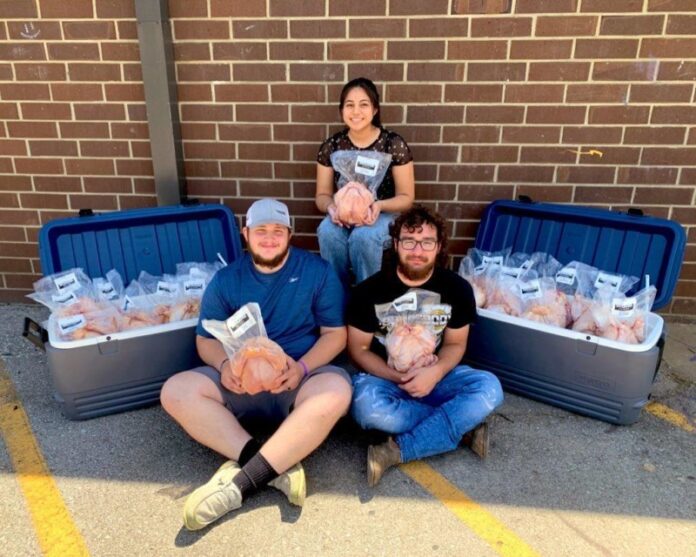
By ABIGAYLE BROWN
Rutherford County Schools
The Smyrna FFA chapter in Smyrna, TN has been awarded a Spring Semester-Long Living to Serve Grant in the amount of $1200.
The nationwide program provides grant money to local FFA chapters to support semester-long service-learning projects that address needs related to community safety; environmental responsibility; hunger, health and nutrition; and community engagement during the fall semester.
Smyrna FFA plans to help address hunger in our community by raising Cornish cross chickens, known as a meat breed of chicken. This breed grows at a fast rate, making it easy to feed many people in a short amount of time.
The chapter will be donating all the chicken meat to the Nourish Food Bank in Middle Tennessee.
The chickens were fully grown and processed on May 19.
The project began on March 10 when chapter advisor, Abby Brown, picked up seventy-five chicks that had been shipped through Tennessee Farmers Co-Op from Mt. Healthy Hatcheries. Students attending school in-person and enrolled in large animal science were responsible for daily care of the chicks.
The chicks started their lives at school living in a large brooder that was donated to the school from Tractor Supply Co.
Students were responsible for cleaning the brooder, checking temperature regulation in each brooder level, feeding and watering. Students who were participating via distance learning received daily email updates on the chickens, which they were required to respond to.
As the chicks grew, they were moved to one of the school courtyards and students continued to care for the chickens daily.
While students enjoyed the hands-on project, they faced and overcame many challenges.
Smyrna High School is an urban school where most students have little to no experience with livestock animals.
A big challenge for students to overcome was the smell of chicken poop. To help control the smell, students raked up the feces weekly to use as compost for the greenhouse and plant science program.
Students also learned that animals must be taken care of regardless of weather.
There were days the entire class made makeshift rain jackets, borrowed the classroom set of shoes, and trudged out in the mud to make sure the chickens heat lamp was working, and they had food and water.
Students were also tasked with putting leg bands on every chicken. Leg bands on chickens are like collars on dogs. This allowed students to identify each bird individually and keep an accurate record of notes.
Students thought their biggest challenge would be caring for the chickens, but the big challenge came in the form agriculture communications.
There are many misconceptions out there about what it means and what it takes to raise meat chickens.
Students were often given the opportunity to talk about raising the chickens and educate others on the process of raising their own food. In addition to facing pushback, in-person students were required to email a teacher and a distance learning student a weekly update on the Living to Serve Project.
This helped to reinforce student writing and professional communication skills.
Four students assisted Brown on a field trip to the processing center.
These students helped to transport the chickens safely and carefully to the processor. As a result, the Smyrna FFA Chapter is donating over 100 pounds of chicken to Nourish Food Bank.
The chapter hopes that this will become an annual donation.
Last year, the National FFA Organization’s Living to Serve Platform provided over $500,000 to FFA chapters across the United States, Puerto Rico and the U.S. Virgin Islands. Living to Serve Grants are sponsored by CoBank, Tractor Supply Company, Cargill, Chevrolet and CSX.
For more information and a complete listing of sponsors, visit FFA.org/livingtoserve.
The National FFA Organization provides leadership, personal growth and career success training through agricultural education to 700,170 student members who belong to one of 8,612 local FFA chapters throughout the U.S., Puerto Rico and the U.S. Virgin Islands.
















